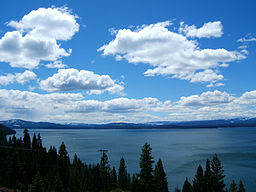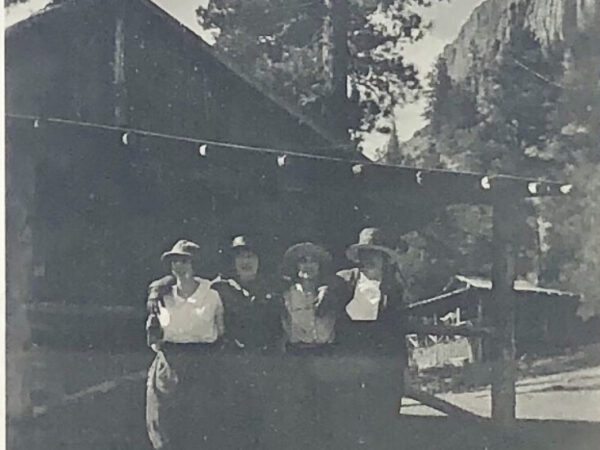I knew my Grandma Hazel Mickelsen Ganus well. She died in 1987, the day before our third child was born. I was fortunate enough to know her during my childhood, throughout my teen years and into my adult life. Even though we lived several states away, every summer we made the trek across the country to visit our family in Colorado. We had family dinners at her house and I often spent the night there. Although she did not like to travel, I remember several visits that she made to our home.
I say I knew her well, but in reading her life history I realize that although our lives overlapped, there was so much that I didn’t know about her at the time. Thankfully she did record some of her experiences in a life history and from that I have a few glimpses into her world, but oh how I wish that I had heard the stories straight from mouth.
I’ve heard people talk about the Great Depression and what it was like but I think for those of us who have lived in a world with so many comforts, it is hard to imagine how bad things really were for so many. My grandparent’s life was deeply impacted by those hard years. While many of my grandparent’s siblings remained in Colorado and Oklahoma and continued to farm during the difficult Depression Era, Grandpa Heber Monroe Ganus and Grandma Hazel bundled up their kids and followed Heiselt Construction on various projects throughout Utah and California.
 |
| Lake Almanor Public Domain |
One of the projects took Grandma and Grandpa Ganus to Northern California where Grandpa worked to help clear forest land for a railroad track that would run from Keddy, California to Klamath Falls, Oregon. During that time they lived in a small camp a short distance from Lake Almanor. There, Grandpa gratefully worked when so many were without work. In her history, Grandma shared some of her observation of things they saw during those years.
By Unknown – Library of Congress
Public Domain,
Speaking of their time there in the camp near Almanor Lake, she said:
“This was during the depression and so many people were out of work, we could see men walking along the highway with packs on their backs, any time of the day looking for work. Mr. Heiselt was very good to feed them that came asking for food.
“Some of the men got to coming to our house asking for food. I always gave them something to eat. We felt sorry for them. These people were called bindelstiffs.
“The railroads allowed people to ride free. Many days we would see big long freight trains go by with people riding all over them, some on the flat cars, some on box cars, some in gondolas, and one time we even saw a woman with a baby riding on top of a boxcar.
“One night three men came to our place asking for something to eat. I gave them some potatoes, a can of corn, bread and some coffee. They seemed real glad to get them. But they went just a little way from the house, where there was a place someone else had fixed to cook on. They built a fire and cooked their supper, then laid down in their sleeping bags around the fire to sleep.
“I was so nervous and frightened I didn’t sleep any all night. In fact, I sat by a window where I could see what was going on. Heber wanted me to go to bed, saying they wouldn’t harm us, but I just couldn’t. Goodness knows I don’t know how we could have protected ourselves from them if they had, for we didn’t even have any kind of a gun or even a dog. I was so glad when morning came and they were gone. The ground was covered with snow, too.
“The majority of this kind of people were good, just out of work and looking for a job of some kind. There were eight or ten companies working on this job, and they probably hit all of them for work.”
The thought of large groups of people riding on top of trains and men walking along the road looking for work is heartbreaking. Grandma indicated that they called the people bindlestiffs, a word I had never heard before, so I looked it up and learned that according to Merriam-Webster, bindlestiff refers to a “hobo: especially one who carries his clothes or bedding in a bundle.”
It was not an easy time to support a family, nor was Grandpa’s work easy to do, but for a time, he had work when many were unemployed. At first, Grandpa was paid and they had hope things would work out. But in the end, Heiselt began to have financial trouble, workers went unpaid and word spread that Heiselt’s machinery was heavily mortgaged and that the company was in serious financial trouble. Sadly my grandparents realized that they would never see the $2,000 owed to them, so they packed up their kids and what little they had and returned to Colorado.
Copyright © Michelle G. Taggart 2016, All rights reserved




The Depression was a terrible time for so many. My father-in-law was a young teen when it began and was hungry so much that, for the rest of his life, he made sure everyone had 3 square meals a day. We have letters and replies that he wrote all over the country, looking for work. He finally was accepted into the Army and served in the Cavalry.
I too wish I could ask my grandparents about the Depression. However, their story was probably the exception. My mother got dance and piano lessons, so I know they were not hungry. Momma told me about some of her friends who came to school barefoot. My great-grandfather and 2X granduncle both had stores and they often gave food for free. Some customers traded their "things" for what they needed. Your grandmother's report is interesting in that it's so much like today – we want to be charitable and help people, but we also often fear them.
I had both of my grandmothers into my early and mid-20s but there are so many things I would ask them now that I wouldn't have thought of then; their Depression era experiences being among those things. This is a wonderful post.
My Mom's parents lost there home during the depression. My Mom was only 5 or 6 at the time and never forgot those years. We can never know all the trials our families endured, but sharing their stories helps. Thanks for this one Michelle.
Oh I would love to ask them so much as well Anna! Thank you!
I can only imagine the desperation he felt trying to find work and meeting rejection after rejection. He was smart to join the Army!
Yes, it sound like your grandparents were some of the lucky ones and definitely among the exception. Thankfully good people like your great-grandfather and 2X granduncle helped many who otherwise would probably have gone without. I am sure you have no idea how many lives they blessed.
How sad Diane. It is amazing how many stories are shared by those who were so young during that time. It must have been such a frightening time. We can look back and know it eventually got better, but of course they had no idea if and when things would improve.
How wonderful that you have your grandmother's stories – what a glimpse into her life. Like Wendy, my dad was one of the fortunate ones as I don't believe their life changed at all. In fact, it may have even gotten better as my grandparents moved the family into a new home in the mid 30's. My mother's family, on the other hand, was not so fortunate and her parents ended up divorcing. She really never spoke about that time, I think she really just wanted to forget it.
Only one of my grandparents lived long enough for me to meet, sadly, and she died when I was too young to ask such questions. What a precious journal to have!
It is interesting that the experience varied so much Debi. Your dad truly was very fortunate !
I do feel so lucky to have grandma's life story. I wish she had written just a little bit more, but I'm grateful for what I have.